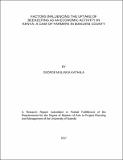| dc.description.abstract | This study focused on the factors that influence beekeeping in Makueni County. The specific objectives were to: establish how training influences farmers uptake of beekeeping as an economic activity in Makueni County; examine the influence of funding on the farmers uptake of beekeeping as an economic activity in Makueni county; establish the influence of institutional support on the farmers uptake of beekeeping as an economic activity in Makueni county; and to explore the influence of sustainable markets on the farmers uptake of beekeeping as an economic activity in Makueni county. The study adopted a descriptive survey study research design. The target population was 1440 persons consisting of farmers and Ministry of livestock officials, from Makueni County. Primary data collection instruments included structured questionnaires, interview guide and observation while secondary data was sourced from the Makueni county website, Ministry of agriculture records in Makueni county, and existing literature on beekeeping. The validity of the research instruments was ascertained through consulting and adopting recommendations of the University of Nairobi supervisors who are experts in research. The reliability of the research instruments was determined after the pilot study using test re test method. The data collected was analyzed through descriptive statistics by use of frequency tables, percentiles and range. Inferential data analysis techniques such as; Pearson correlation analysis to determine the nature and extend of relationships between each independent variable to the dependent variable, while regression model was drawn to determine the extent to which the influencing factors account for the uptake of beekeeping in Makueni county. The study found out that 73% of farmers in Makueni County considered beekeeping as a viable economic activity while only 30% practiced beekeeping. The influencing factors namely:- Training, funding, institutional support and sustainable markets were established to be the main factors influencing beekeeping in Makueni county. Each individual factor however influences beekeeping in different aspects and magnitudes. The demographic findings from the study confirm a common phenomenon in rural semi-arid regions- rural urban migration which depletes such areas of the energy and literacy required to boost sustainable development.
The research recommends that county governments in arid and semi-arid regions should partner with other development stake holders and allocate resources to boost beekeeping activities to a commercial scale. This would significantly uplift the standards of lives for their people. Other countries such as Uganda, Ethiopia, and India have successfully commercialized beekeeping employing thousands of its people, The Kenyan government should formulate a policy that empowers and puts beekeeping on the same level with other key Kenyan farm export products such as coffee and tea. | en_US |

